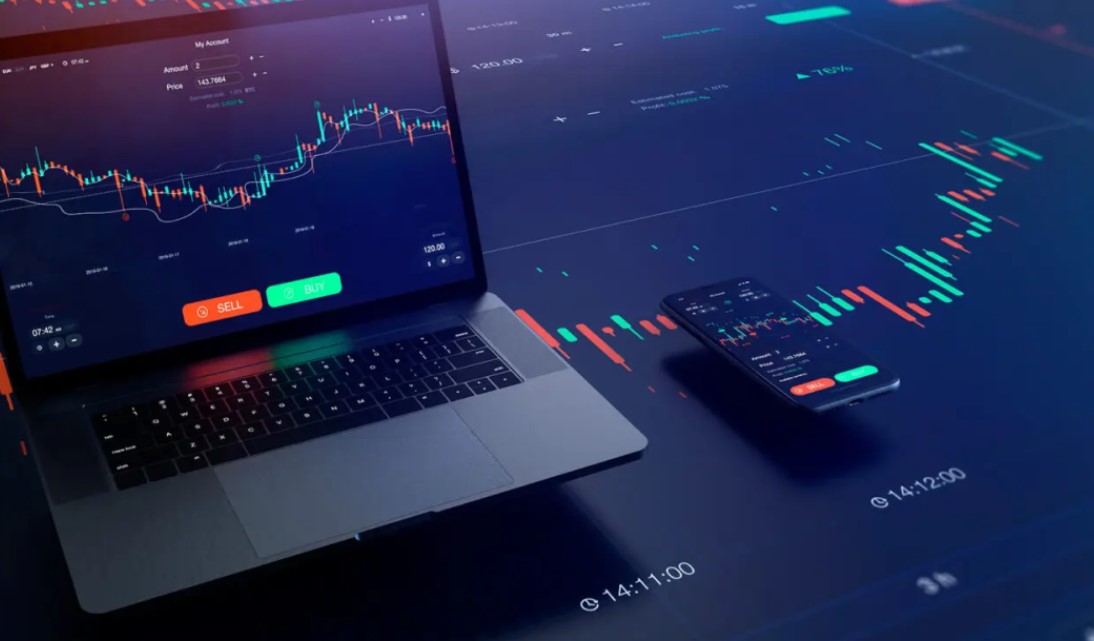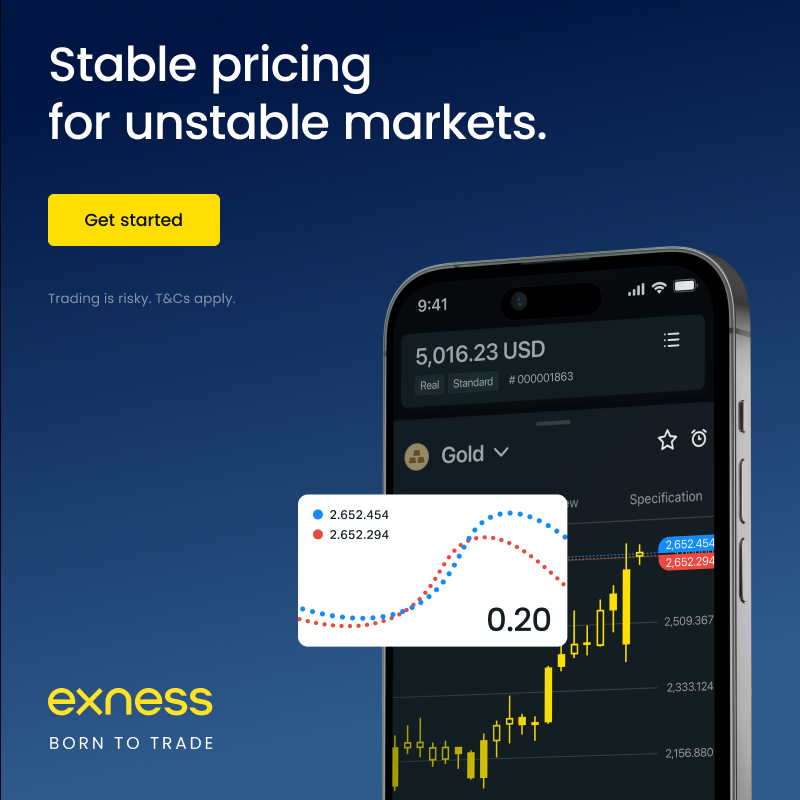
10 minute read
How to Start Forex Trading in Ghana: A Comprehensive Guide
from Exness
by Exness_Blog
Forex trading, or foreign exchange trading, has surged in popularity across Ghana, offering individuals a chance to tap into the world's largest financial market. With daily trading volumes exceeding $7.5 trillion, forex trading presents an opportunity to generate income, even with a modest initial investment. For Ghanaians looking to start forex trading, this guide provides a step-by-step roadmap, practical tips, and essential strategies to navigate this dynamic market successfully. Whether you're a complete beginner or seeking to refine your approach, this article will equip you with the knowledge to begin your forex trading journey in Ghana.
Top 4 Best Forex Brokers in Ghana
1️⃣ Exness: Open An Account or Visit Brokers 🏆
2️⃣ XM: Open An Account or Visit Brokers 💥
3️⃣ JustMarkets: Open An Account or Visit Brokers ✅
4️⃣ Quotex: Open An Account or Visit Brokers 🌐
Understanding Forex Trading: The Basics
Forex trading involves buying and selling currency pairs, such as EUR/USD (Euro/US Dollar) or USD/GHS (US Dollar/Ghanaian Cedi), to profit from fluctuations in their exchange rates. The forex market operates 24 hours a day, five days a week, across major financial centers globally, making it highly accessible for traders in Ghana. Unlike traditional investments like stocks or real estate, forex trading offers high liquidity, leverage, and the ability to profit in both rising and falling markets.
For Ghanaians, forex trading is particularly appealing due to its low entry barriers. With as little as $5-$100, you can start trading, thanks to brokers offering flexible account options. However, success requires education, discipline, and a solid strategy, as the market’s volatility can lead to significant gains or losses.
Why Forex Trading is Growing in Ghana
Ghana’s improving internet infrastructure and rising smartphone penetration have made online forex trading more accessible than ever. The country’s high unemployment rates and the allure of financial independence have also driven interest in forex as a potential income source. Additionally, the Ghanaian Cedi (GHS) experiences volatility due to economic factors like inflation and global trade, creating trading opportunities for savvy investors.
However, the lack of local regulation for online forex trading means Ghanaians must exercise caution when choosing brokers. The Bank of Ghana (BoG) regulates physical currency exchanges, but online speculative trading falls into a gray area, making it critical to select reputable, internationally regulated brokers.
Step-by-Step Guide to Start Forex Trading in Ghana
1. Educate Yourself on Forex Trading Basics
Before risking any capital, invest time in learning the fundamentals of forex trading. Key concepts to understand include:
· Currency Pairs: Traded in pairs (e.g., EUR/USD), where the first currency is the base, and the second is the quote currency. The price reflects how much of the quote currency is needed to buy one unit of the base currency.
· Pips: The smallest price movement in a currency pair, typically the fourth decimal place (e.g., a change from 1.1000 to 1.1001 is one pip).
· Leverage: Allows you to control larger positions with less capital but increases both potential profits and losses.
· Spreads: The difference between the bid (sell) and ask (buy) prices, representing the broker’s fee.
· Stop-Loss and Take-Profit Orders: Tools to manage risk by automatically closing trades at predetermined levels.
Free resources like Babypips.com, YouTube tutorials, and webinars from reputable brokers are excellent starting points. Consider reading books like Market Wizards by Jack D. Schwager or taking online courses such as “Forex Trading A-Z” by Kirill Eremenko for structured learning.
2. Choose a Reliable Forex Broker
Selecting a trustworthy broker is crucial for your trading success. Since Ghana lacks specific regulations for online forex trading, opt for brokers regulated by reputable international authorities like the Financial Conduct Authority (FCA) in the UK, the Australian Securities and Investments Commission (ASIC), or the Cyprus Securities and Exchange Commission (CySEC). Here are key factors to consider:
· Regulation and Licensing: Ensure the broker is regulated to protect your funds.
· Trading Platforms: Popular platforms like MetaTrader 4 (MT4) or MetaTrader 5 (MT5) are user-friendly and widely used in Ghana.
· Fees and Spreads: Look for competitive spreads (e.g., 0.9 pips on EUR/USD) and low or no commissions.
· Payment Methods: Choose brokers that support local payment options like M-Pesa, mobile money (e.g., MTN Mobile Money), or bank cards for easy deposits and withdrawals.
· Customer Support: Opt for brokers with responsive, 24/7 support to address any issues.
Recommended brokers for Ghanaian traders include Exness, XM, Pepperstone, and FXTM, which offer robust platforms, competitive pricing, and support for African traders. Always conduct due diligence by reading reviews on platforms like ForexBrokers.com.

💥 Trade with Exness now: Open An Account or Visit Brokers 🏆
3. Open a Forex Trading Account
Opening a trading account is straightforward and can be done online in minutes. Follow these steps:
· Research Brokers: Compare brokers based on regulation, fees, and platform features.
· Complete the Application: Provide personal details and submit identification documents (e.g., passport, national ID, or proof of address) to comply with Know Your Customer (KYC) requirements.
· Choose an Account Type: Most brokers offer demo accounts, standard accounts, or micro accounts for beginners. Start with a demo account to practice without risking real money.
· Fund Your Account: Deposit funds using mobile money, bank cards, or e-wallets like Skrill or Neteller. Some brokers accept deposits as low as $5, making it accessible for beginners in Ghana.
4. Practice with a Demo Account
A demo account allows you to trade with virtual funds, helping you test strategies and familiarize yourself with the trading platform. Brokers like Exness and JustForex offer unrestricted demo accounts, enabling you to practice for as long as needed. Use this time to:
· Experiment with different currency pairs, such as USD/GHS or EUR/USD.
· Test trading strategies like scalping, day trading, or swing trading.
· Learn to set stop-loss and take-profit orders to manage risk.
Only transition to a live account once you’ve consistently achieved profits on the demo account and feel confident in your strategy.
5. Develop a Trading Plan
A trading plan is your blueprint for success, outlining your goals, risk tolerance, and trading strategy. Key components include:
· Trading Goals: Define whether you aim for short-term gains (e.g., scalping) or long-term profits (e.g., trend trading).
· Risk Management: Risk no more than 1-2% of your account per trade to protect your capital. For example, with a $100 account, limit your risk to $1-$2 per trade.
· Entry and Exit Rules: Use technical analysis (e.g., moving averages, RSI) or fundamental analysis (e.g., monitoring Ghana’s economic data) to identify trade opportunities.
· Trading Journal: Record every trade to track performance, identify patterns, and refine your strategy.
Discipline is key—avoid emotional decisions driven by fear or greed, which can lead to significant losses.
6. Fund Your Account and Start Trading
Once you’re ready to trade with real money, start with a small deposit you can afford to lose. Use low leverage (e.g., 1:10 or 1:20) to minimize risk, as high leverage can amplify losses. Popular trading times for Ghanaians include the London-New York session overlap (late afternoon to early evening local time) for high liquidity and volatility, or the Tokyo session (early morning) for steadier conditions.
7. Stay Informed and Keep Learning
Forex markets are influenced by global economic events, such as interest rate changes, inflation reports, and geopolitical developments. Stay updated by following:
· Economic Calendars: Monitor key events like Ghana’s GDP releases or U.S. Federal Reserve announcements.
· News Outlets: Reuters and Bloomberg provide reliable market updates.
· Trading Communities: Join local or online forex trading groups in Ghana for insights and mentorship.
Continuous learning is essential. Attend webinars, read trading books, and follow successful traders like Kojoforex, a prominent Ghanaian trader, for inspiration.
Popular Forex Trading Strategies for Beginners
· Scalping: Involves making quick trades to capture small price movements (a few pips) multiple times a day. Ideal for traders with limited time but requires fast execution.
· Day Trading: Trades are opened and closed within the same day, avoiding overnight risks. Suitable for those who can monitor markets actively.
· Swing Trading: Holding trades for days or weeks to profit from medium-term price movements. Best for patient traders who analyze trends.
· Trend Trading: Following long-term market trends using technical indicators like moving averages or MACD.
Start with a simple strategy and refine it as you gain experience. Tools like TradingView for market analysis and MT4 for trade execution are highly recommended for Ghanaian traders.
Risk Management: Protecting Your Capital
Forex trading is inherently risky, with 51-89% of retail traders losing money due to leverage and market volatility. To safeguard your funds:
· Use Stop-Loss Orders: Automatically close trades to limit losses.
· Position Sizing: Adjust trade sizes based on your account balance and risk tolerance.
· Diversify Trades: Avoid putting all your capital into one currency pair.
· Avoid Over-Leveraging: High leverage (e.g., 1:100) can wipe out your account if trades move against you.
For example, if you have a $200 account and risk 1% per trade, your maximum loss per trade should be $2. This disciplined approach ensures you can withstand losses and stay in the game.
Legal and Tax Considerations in Ghana
The Bank of Ghana and the Securities and Exchange Commission (SEC) oversee financial activities, but online forex trading remains unregulated. This means you must choose brokers with strong international oversight to avoid scams. The SEC has warned against fraudulent schemes promising unrealistic returns, so verify a broker’s credentials before investing.
Forex trading profits in Ghana are subject to taxation by the Ghana Revenue Authority (GRA). Keep detailed records of your trades, including profits, losses, and expenses, to ensure compliance. Consult a tax professional to understand your obligations.
Common Mistakes to Avoid
· Lack of Education: Trading without understanding the market can lead to significant losses.
· Overtrading: Taking too many trades or risking too much capital can deplete your account.
· Ignoring Risk Management: Not using stop-loss orders or risking more than 1-2% per trade is a recipe for failure.
· Emotional Trading: Letting fear or greed dictate decisions often leads to poor outcomes.
· Choosing Unregulated Brokers: This increases the risk of fraud or loss of funds.
Tools and Resources for Ghanaian Forex Traders
· Trading Platforms: MetaTrader 4/5, TradingView, and proprietary broker platforms.
· Educational Resources: Babypips.com, ForexBrokers.com, and YouTube channels like Kojoforex.
· Payment Methods: Mobile money (MTN, Vodafone), M-Pesa, bank cards, and e-wallets like Skrill.
· Mentorship: Connect with experienced traders or enroll in programs like Forex Trading Academy for personalized guidance.
The Path to Success in Forex Trading
Forex trading in Ghana offers immense potential but requires patience, discipline, and continuous learning. Start by educating yourself, choosing a regulated broker, and practicing with a demo account. Develop a trading plan, manage risks diligently, and stay informed about market trends. While the journey may be challenging, a strategic approach can lead to consistent profits over time.
For Ghanaians, forex trading is not just a financial opportunity but a chance to achieve independence in a digital economy. By following the steps outlined in this guide, you can confidently embark on your forex trading journey and unlock the potential of this global market.
💥 Note: To enjoy the benefits of the partner code, such as trading fee rebates, you need to register with Exness through this link: Open An Account or Visit Brokers 🏆
Read more:








